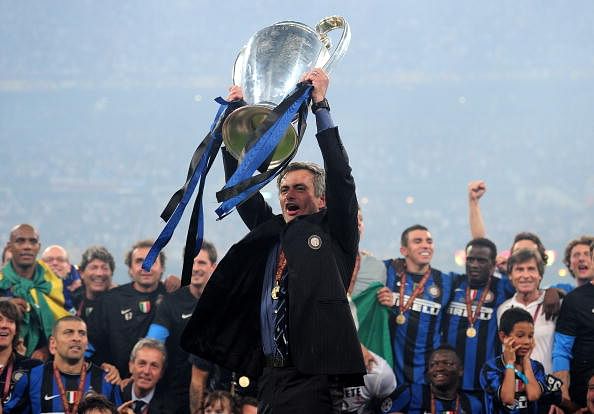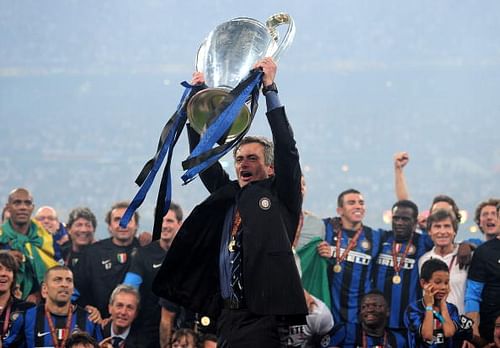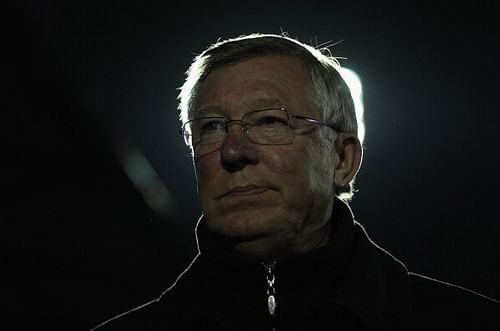
The art of football management - Longevity vs short term success

There are 2 types of great managers – ones who find success whoever they coach in whichever country (Ernst Happel, Giovanni Trapattoni) and two, who thrive in longevity (Sir Alex Ferguson, Bob Paisley, Valeriy Lobanovskyi, Sir Matt Busby). Both types require a wide variety of skill sets, but which one is more arduous, which one is more challenging; A test of will, courage, determination, hunger, evolution all these words point towards the latter – longevity. Let’s take the examples of present greats Jose Mourinho and Sir Alex Ferguson to discuss this in detail.
Jose Mourinho announced himself to the footballing world with a historic treble at Porto. From being a mere language translator in Barcelona to winning the La Liga with Madrid, the self proclaimed ‘Special One’ has undergone a meteoric rise within football circles in less than a decade. He started off his coaching career with short stints at Benfica & Uniao de Leiria. He moved onto Porto for two seasons, Chelsea for another three, Inter for two and then currently at Los Blancos, where the magic number most likely is going to be three.
At first glance, this seems to be a path of a man who knows what he is doing – treble at Porto, first league championship for Chelsea in almost 50 years, treble again at Inter and then snatching the league title from arguably the best team ever in the history of club football. Albeit, looking deeper into the Mourinho magic, we could find that all is not well; Mourinho after all, seems to be a one-trick pony. So far, he has yet to prove himself beyond the second season. The magic spell that seems to motivate players who are willing to die for him (Deco, Carvalho, Lampard, Terry, Drogba, Materazzi, etc.) seems to wear off and therein lays the biggest challenge in management. Mou has the hunger and desire to win, and charisma like no other but so far he has not evolved with the changes in the players’ mind. After two years of success, the mind gets complacent, they need to be motivated consistently over a period of time and the special one is yet to prove he can do that. Mourinho has not done justice to the hunger and determination he shows in the first two years of club management. You should be motivated throughout and should be able to transfer it down to your players and this is the biggest challenge of a football manager. If you fail to motivate yourself or you fail to motivate the players, then you have then failed yourself and the club.
Consider Giovanni Trapattoni, the most successful manager in Serie A. During his time with Juventus, he won all UEFA club competitions (a record intact till now). He could have built a dynasty with Juventus but instead, he wanted a new challenge because he could not motivate himself beyond a certain point at Juve, thus he moved to Inter where he enjoyed another successful period. He then moved to Bayern Munich, Cagliari, Fiorentina, the Italian national team, Benfica, Stuttgart, Red Bull Salzburg and now the Republic of Ireland. All this peregrination shows that he was not able to motivate himself at one place amidst all the pressure of being a football manager. Look at the most recent example of Josep Guardiola. He broke all sorts records at Barcelona but when a season came where he started to lose control of the dressing room, where the pressure reached boiling point, he quit and that’s why the likes of Bob paisley, Valeriy Lobanovskyi and Sir Alex Ferguson should be admired more as football managers beyond all measure.

When Sir Alex was instated as the manager of Manchester United in 1986, United had not won a title since 1967, Liverpool were the top dogs in England and Europe, Boris Becker had just won his second Wimbledon title, Ayrton Senna was just in his 3rd season in F1 and Sachin Tendulkar was yet to play for the Indian Cricket team. Twenty six years later, United have been the most successful team in England if not the world, Liverpool are no longer top dogs in England and Europe, Boris Becker retired along with other champions such as Pete Sampras and Andre Agassi, Ayrton Senna left us after becoming one of the greatest champions F1 ever and Sachin Tendulkar has retired from ODI Cricket. The sporting world has undergone drastic changes financially and in terms of media, and to challenge oneself with the same grit and determination, evolving with the changes, evolving with the times at the highest level is an achievement in itself. In his 26 years, despite the enormous amount of success and humongous amount of pressure, Ferguson has been able to handle himself. He has maintained his own desire and also transferred it down to his players. Not once has he lost control of the dressing room. He has put together 5 separate United teams, each successful in their own way. Liverpool, Blackburn, Newcastle, Arsenal, Chelsea and now City have all challenged the fiery Scot but despite all the success against these teams, he has still kept his hunger, his determination and fought back to the top each time. This is the toughest job of a manager. One often comes across the following phrase – “the second season is always more difficult than the first”. Sir Alex has managed to keep a level of consistency that is unmatched for 26 years. Evolution is the key as a manager. Moving forward with the world, with the trends, with the financial situation, with the media hype, Ferguson has outdone everything.
Let’s take another example of Bob Paisley who had to take over Liverpool football club unexpectedly from Club Legend Bill Shankly. During Paisley’s nine seasons in charge, Liverpool were League Champions on six occasions and finished second twice, won three League Cups (the first time that Liverpool had won the trophy), 1 UEFA Cup, 1 European Super Cup, 5 Charity Shields and most significantly, they won the club’s first 3 European Cups. To keep this amount of hunger and to continually motivate the players is a task in itself and this, in my opinion, is the most difficult task as a manager.
What the likes of Jose Mourinho and Trapattoni have achieved is by no means a minor feat. But as a manager, as a leader, to continuously challenge themselves to be better even though they are number 1 in the world, is what sets them apart from the rest. Andres Villas-Boas said after winning the minor treble with Porto that he would be lucky if he were to manage at the top level for 10 years (at any club). To achieve longevity with the same amount of consistency at the same place is much more difficult than repeating the feat at different places. Success with longevity at one place outdoes short-term success at different places.